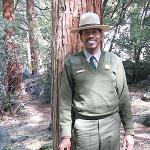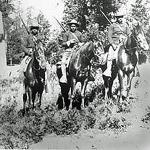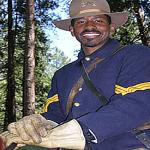24 November 2009

J. Sluizer
Shelton Johnson began working in national parks when he was still in collegeAs an interpretive specialist at Yosemite, Ranger Shelton Johnson tells visitors about the history of the park. While researching Yosemite's archives, he learned that for three years, around the turn of the twentieth century, black U.S. Army regiments patrolled the park.
The military presence wasn't unusual because until the National Park Service was created in 1916, all national parks were patrolled by Army cavalry troops. But, Johnson explains, these were the first African-Americans given that mission. "They're protecting the park from the people who were using the park and protecting the people who were using the park from the park. It was both."
A connection with Native Americans
African-American troops came to be known as Buffalo Soldiers.[http://www.nps.gov/yose/historyculture/buffalo-soldiers.htm] The name was given to them by the American Indians, who saw a resemblance between their dark curly hair and the coat of the buffalo.
Johnson incorporates the story of the Buffalo Soldiers and his own Native American heritage - both his parents are part Indian - into the tales he weaves for youth groups and tourists. He explains that many of the Buffalo Soldiers also had Indian blood. They fought their brothers because it was their job as soldiers, but, Johnson says, the irony was not lost on them. Both were indigenous people taken from their land.
"The two groups who have the most in common are killing each other," he points out. "People of African descent would escape from plantations and they received refuge [from] Native Americans. They took them in. That's how there's Indian blood in my family. So the people who gave you refuge, you're now killing, you are now fighting," Johnson says.
In presentations, he adopts the voice and demeanor of a Buffalo Soldier, as he explains the dilemma these soldiers faced.
"Some choices you make. Some choices are made for you," he said. "I didn't want to be a soldier but I didn't want to pick cotton. I'm a man. I want to have some respect. You put that uniform on and I tell you, you look pretty. You got that hat, you got that horse underneath you. You think you're somebody. It's important for you to feel in your life that you're someone, that you're a human being. But it don't feel right when you have to take someone else's life to make your life feel like it's better."
Changing the physical and social landscape of the West

National Park Service
In this 1899 photo, Buffalo Soldiers in the 24th Infantry carry out mounted patrol duties in YosemiteBuffalo Soldiers were responsible for cutting the first usable wagon road through Yosemite's Giant Forest of Sequoia trees. They carved the first hiking trail to the top of Mt. Whitney, the highest mountain in the continental United States and they built the first museum in the National Park system. It was an outdoor arboretum with trails, benches and signs identifying native plants with their English and Latin names.
But, Johnson says, the physical work was the easy part. Telling white pioneers that they could no longer shoot game in the boundaries of Yosemite National Park to feed their families or cut down trees for firewood was much harder.
Changing his voice to his Buffalo Soldier persona, Johnson again slips into character to tell the story of an encounter with a local as he's about to leave camp with his fire still burning.
"They hear the tone in my voice which is the tone of a sergeant. I say: 'Sir, I can see you got your horse all saddled, you need to put that fire out.' They hear that tone, and that kind of tone that I just said, that gets you killed in Mississippi. Talking to the white man like that. But that's my job. I'm a soldier. I'm a sergeant. The man's got to do what I ask him to do and he's got to do it now. That don't go over very well. It's like drinking whiskey for the first time. Burns your throat going down and that's how some people respond," he said.
Johnson says that the Buffalo Soldiers learned to keep their tempers under control, because if they didn't rise above a conflict, they'd be court-martialed and lose their jobs. And, Johnson points out, being a soldier was a great job for an African-American to have at that time in United States' history.
A modern message of pride and respect

National Park Service
Park ranger Shelton Johnson portrays one of the U.S. Army's Buffalo Soldiers as part of his interpretation of Yosemite's historyHe says telling the story of the Buffalo Soldiers has an impact on young blacks today. "It's not an easy thing to grow up in this country and to be proud of being African-American. Because there are many messages out there - some overt, some covert, some obvious, some subliminal - that suggest that you are not worthy; that you are not as good. So the message of the Buffalo Soldiers is that in that time when racism was at its most virulent, that there were people, there were men who said, 'No, you're wrong, I am just as good as you are. As a matter of fact, I may even be better than you are.' That's very powerful," Johnson says.
This past September, Sierra Club books published Shelton Johnson's first novel, called Gloryland. It is a fictionalized account of an African-American man born on January 1st, 1863, the day President Abraham Lincoln issued the Emancipation Proclamation, who becomes a Buffalo Soldier in Yosemite National Park.